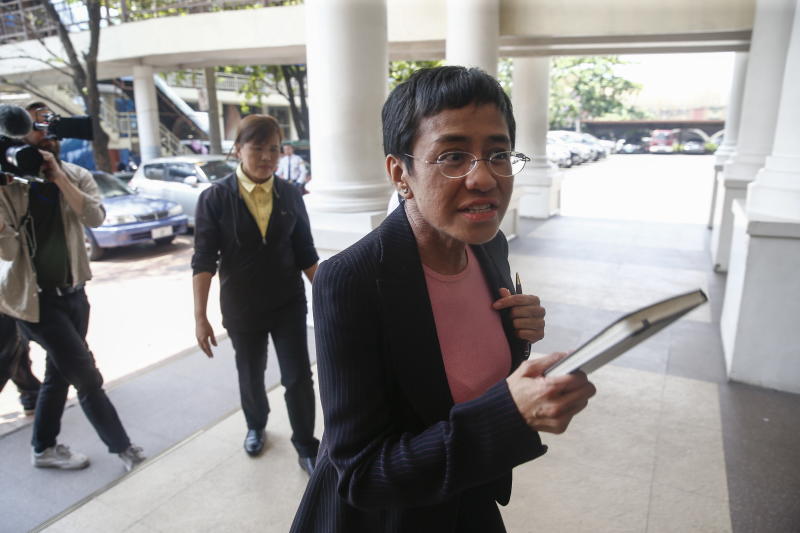Anti-Duterte Filipino journalists slam government efforts to silence critics
Sign up now: Get insights on Asia's fast-moving developments

Founder of online news site Rappler Maria Ressa has been charged in 11 cases, all of which she says are part of a coordinated campaign of legal harassment and online trolling intended to discourage journalists from questioning Mr Duterte.
PHOTO: EPA-EFE
Follow topic:
MANILA - Prominent anti-government journalists in the Philippines on Friday (May 3) have marked World Press Freedom Day by slamming what they described as state-sponsored efforts to silence news organisations which have run stories criticising President Rodrigo Duterte's drug war and family wealth.
"The facts are clear. The track record is there. Action speaks louder than words. From the actions of the government, we've seen not just a significant erosion of press freedom but death by a thousand cuts of democracy," Ms Maria Ressa, founder of online news site Rappler, told a news conference.
Ms Ressa has been charged in 11 cases, all of which she says are part of a coordinated campaign of legal harassment and online trolling intended to discourage journalists from questioning Mr Duterte.
Rappler has published reports scrutinising Mr Duterte's brutal crackdown on the narcotics trade, and pivot to China.
It has accused the government of funding a network of bloggers and trolls that attack Mr Duterte's opponents, and ran a story linking one of the President's closest aides to a questionable military procurement deal.
The government recently tagged Ms Ressa and several of the country's veteran journalists in a purported plot to oust Mr Duterte.
Most belong to media groups that, like Rappler, had worked on long investigative pieces on the president.
One of these organisations, the Philippine Centre for Investigative Journalism (PCIJ), recently published a series raising doubts over the sources of Mr Duterte's wealth.
Two weeks ago, Mr Duterte's spokesman released a "matrix" that purportedly revealed how editors of Rappler, PCIJ and two other groups - Vera Files and the National Union of Peoples' Lawyers - colluded to distribute Youtube videos that linked Mr Duterte and his closest kin and aides to the drug trade.
Ms Ressa dismissed the allegation as "garbage", and "another government ploy to harass journalists".
The PCIJ, for its part, said the report was "wrong on many points".
Last week, pro-Duterte newspaper columnists and bloggers accused Rappler, PCIJ, Vera Files and the Centre for Media Freedom and Responsibility of receiving millions from alleged fronts of the US Central Intelligence Agency (CIA).
They alleged that the money was meant to finance efforts to "demonise" Mr Duterte for breaking longstanding ties with the US as he steers the Philippines closer towards China.
The four media organisations disclosed that they were receiving help from US organisations, but denied that this was CIA-backed or represented ownership or control over their affairs.
"They are demonising foreign funding… There's nothing wrong with accepting assistance from foreign organisations. The government itself accepts foreign aid," said Vera Files chief Ellen Tordesillas.
Ms Sheila Coronel, a co-founder of PCIJ who is now dean of Columbia University's Graduate School of Journalism, said in a statement that the government was moving to "soften the ground for a clampdown on the press and civil society".
A coalition of media groups reported that since Mr Duterte took office in 2016, 12 journalists have been killed. Most had been working stories on corruption and police abuses.
"The crackdown is ongoing, and it's going to be worse," said Mr Luis Teodoro, a former dean of the University of the Philippines' College of Mass Communications.

